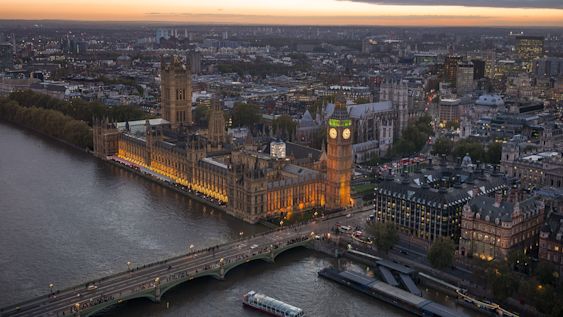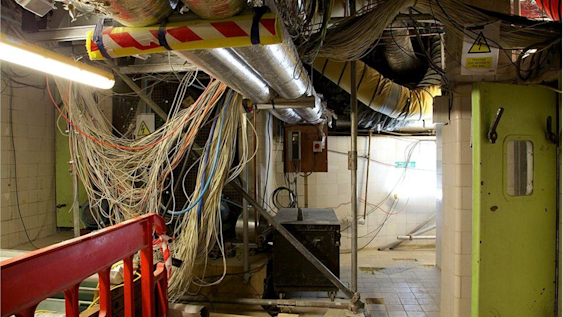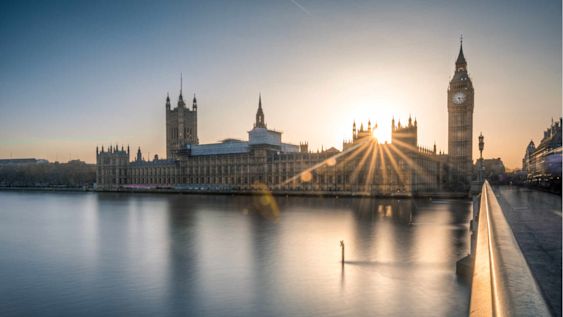
Russia-Ukraine crisis: how are sanctions Regulations made and how does Parliament scrutinise them?
The UK’s new Russia sanctions Regulations, being debated by the House of Commons on 22 February 2022 with one day’s notice, highlight the use of delegated legislation to introduce sanctions regimes and the challenges posed for parliamentary scrutiny of urgent measures.
On 10 February 2022, the government made and laid a Statutory Instrument (SI) on sanctions against Russia that came into force at 5:00pm the same day - the Russia (Sanctions) (EU Exit) (Amendment) Regulations 2022 (SI 2022/No. 123) (‘Russia sanctions SI’). The SI was made using powers in the Sanctions and Anti-Money Laundering Act 2018 (‘the Sanctions Act’).
On 21 February 2022, the government announced that the Russia sanctions SI would be debated and decided on by the House of Commons today, 22 February. Ahead of today’s debate, this blogpost outlines the legislative process used to deliver the new sanctions Regulations.
What does the Russia sanctions Statutory Instrument do?
Following Russia’s illegal annexation of Crimea in 2014, the EU introduced sanctions against Russia that had direct effect in the UK. To ensure that the UK continued to operate an effective sanctions regime in relation to Russia after it left the EU, the Russia (Sanctions) (EU Exit) Regulations 2019 (SI 2019/No. 855) were made under the 2018 Sanctions Act. These came fully into force at the end of the transition period on 31 December 2020 and replaced the equivalent EU sanctions regimes in UK law. These 2019 Regulations facilitate financial sanctions (including asset freezes), immigration measures, trade sanctions and enforcement powers.
The Russia sanctions SI laid before Parliament on 10 February 2022 amends these 2019 Regulations to broaden the definition of ‘involved person’ who the Secretary of State can ‘designate’ and who would thus become subject to sanctions. The Explanatory Memorandum for the SI explains that expanding the designation criteria will provide a basis for the UK to designate individuals or entities that are or have been involved in obtaining a benefit from, or supporting, the Government of Russia.
When new Regulations are made under the Sanctions Act to amend sanctions Regulations that have already been made under section 1 of that Act, the Minister is required to lay a report under section 46 of that Act stating their reasons for the amendments. The three-point rationale provided in the ‘Section 46 Report’ for the amendment made by the Russia sanctions SI is that:
- “designations to be made… will bring coercive pressure to bear against the Government of Russia to encourage it to cease actions destabilising Ukraine, and undermining and threatening its territorial integrity, sovereignty and independence”;
- “designations to be made… will constrain the Government of Russia’s ability to maintain its activities with regard to Ukraine. Many of the entities and individuals that could be designated under the amended criteria contribute financially to Russia’s exchequer, or provide resources to the Government of Russia”;
- “the amendment itself as well as designations made using it will send a strong signal of condemnation to Russia”.
What is the legal framework for sanctions?
UK sanctions are implemented primarily through delegated legislation. The main piece of primary legislation which confers power on government Ministers to make sanctions Regulations is the 2018 Sanctions Act.
Other key legislation that might be engaged in making sanctions Regulations - sometimes in conjunction with powers in the Sanctions Act - includes the United Nations Act 1946, the Immigration Act 1971, the Anti-Terrorism, Crime and Security Act 2001, the Export Control Act 2002, the Counter-Terrorism Act 2008, and the Policing and Crime Act 2017.
Sanctions Regulations may be made to introduce UK-specific measures or measures required by the United Nations Security Council or other international bodies. They often take the form of financial measures such as asset freezes, restrictions on access to financial markets and provision of financial services, directions to cease banking relationships or activities, and anti-money laundering provisions. Measures may also restrict or impose controls on immigration, trade, aircraft and shipping.
What are the parliamentary scrutiny procedures for sanctions Regulations made under the Sanctions Act?
The Sanctions Act establishes a legal framework which enables a Minister to impose sanctions to comply with UN and other international obligations, or for other purposes such as the prevention of terrorism, the interests of national security or international peace and security, or the furtherance of a UK foreign policy objective. This is primarily achieved through the delegated powers to make sanctions Regulations which are granted in section 1 of the Act.
Sanctions Regulations under the 2018 Act (made under section 1) are subject to different levels of parliamentary scrutiny depending on what the Regulations relate to:
- Regulations are subject to the ‘made affirmative’ procedure if they are ‘non-UN regulations’ and do not repeal, revoke or amend any provision of primary legislation. This means that the Regulations require parliamentary approval but only retrospectively, within a statutory period.
- Regulations are subject to the ‘draft affirmative’ procedure if they repeal, revoke or amend any provision of primary legislation. This means that the Regulations require parliamentary approval and cannot be made or come into force until they have received it.
- Regulations are subject to the ‘made negative’ procedure if they are not caught by the ‘made affirmative’ or ‘draft affirmative’ criteria. This means that the Regulations do not require active parliamentary approval and can come into force before the end of their 40-day scrutiny period.
Of the 52 SIs laid before Parliament that contain sanctions Regulations made under section 1 of the Sanctions Act, 25 were subject to the ‘made affirmative’ procedure, one the ‘draft affirmative’ procedure, and 26 the ‘made negative’ procedure.
The Russia sanctions SI is subject to the ‘made affirmative’ scrutiny procedure. It is already the law (and has been in force since 5:00pm on 10 February 2022) but needs retrospective parliamentary approval by 19 March 2022 if it is to remain the law. Otherwise, the SI ceases to have effect at the end of that day.
What problems can arise with parliamentary scrutiny of sanctions regulations?
There are problems with arrangements for the parliamentary scrutiny of all affirmative SIs:
- Debates are scheduled by the government, often at short notice - in the case of the Russia sanctions SI, at less than 24 hours’ notice.
- In the House of Commons, the Government decides whether debates take place in a Delegated Legislation Committee (DLC) or on the Floor of the House.
- Debates in the House of Commons normally last for a maximum of only 90 minutes but, on the floor of the House, they can be extended through the agreement of a Business of the House motion - if the Government chooses to move one. In the case of the Russia sanctions SI, the Government has scheduled a Business of the House motion to extend the debate to three hours.
The ‘made affirmative’ procedure also raises concerns about democratic oversight owing to the long delays that can occur between provisions being made into law and them being debated in Parliament. This can happen especially as a result of parliamentary recesses (as was seen with ‘made affirmative’ Covid-19 ‘lockdown’ Regulations in summer 2020). When primary legislation prescribes the ‘made affirmative’ procedure for an SI, it often stipulates that when calculating the scrutiny period “no account is to be taken of any time during which Parliament is dissolved or prorogued or during which both Houses are adjourned for more than 4 days”. Under the Sanctions Act, for example, the default requirement for ‘made affirmative’ SIs is that they must be approved by both Houses before the end of 28 days beginning with the day on which the SI is made. However, the prescribed method of calculating the scrutiny period means that, for a sanctions SI subject to this 28-day scrutiny period, the average time between it being made into law and being debated is 40 and 50 calendar days in the Commons and Lords respectively. (This calculation excludes the Russia sanctions SI).
There has been a proliferation of overly complicated ways of calculating the scrutiny period for ‘made affirmative’ SIs. For example, some Acts specify that only parliamentary sitting days should be used to calculate the scrutiny period, while others have no such specification. Some Acts prescribe a period of 40 days, while others prescribe 28 days. Taking the Sanctions Act as an example, section 55(3) provides for a ‘standard’ ‘made affirmative’ procedure, whereby the SI must be approved by both Houses before the end of 28 days beginning with the day on which the SI is made. However, section 56(5) provides for an alternative process whereby ‘made affirmative’ SIs can instead be subject to a scrutiny period of 60 days beginning with the first day on which any provision of the SI comes into force. There often seems to be no particular rationale for such variation.
Unnecessary inconsistencies increase the likelihood of Government and/or Parliament making timetabling mistakes. Recently, a set of sanctions Regulations ceased to have effect at the end of the 28-day retrospective scrutiny period because government officials and business managers miscalculated the scrutiny period and scheduled the approval debate and vote in the House of Lords after the scrutiny deadline had expired. We uncovered this problem through our monitoring of all SIs laid before Parliament for our SI Tracker, and drew it to the attention of officials in the House of Lords and the Foreign, Commonwealth and Development Office. The motion to approve the SI was taken off the Order Paper and the Regulations will now have to be re-made and re-laid before Parliament and approved by both Houses.
As part of our current Delegated Legislation Review, we are giving careful consideration to how the system could best operate in urgent circumstances. Urgent procedures are essential for circumstances which require rapid response by government, as sanctions Regulations show. However, an appropriate balance must be struck between the demands of speedy law-making and parliamentary scrutiny.
The research for this post was supported by the Legal Education Foundation as part of the Hansard Society’s Delegated Legislation Review.
Enjoy reading this? Please consider sharing it
Latest

Compendium of Legislative Standards for Delegating Powers in Primary Legislation
The scope and design of the delegation of legislative powers in any Bill affects the long-term balance of power between…Parliament and Government. The House of Lords Delegated Powers and Regulatory Reform Committee (DPRRC) scrutinises all such delegation. This report distils standards for the delegation of powers from 101 DPRRC reports from 2017 to 2021.

Genetically modified organisms: Primary or delegated legislation?
A Statutory Instrument comes into force on 11 April that changes the legal requirements for the release of certain types… of genetically modified plants. Some argue that the changes should have been made by primary, rather than delegated, legislation. Where does the boundary between the two lie?

Constitution and Governance in the UK: Parliament and Legislation
The Brexit process, the pandemic and the approach of the Johnson Government have all tended towards Parliament’s margina…lisation and the accretion of executive power. For UK in a Changing Europe’s report on the constitutional landscape, we show how – in the legislative process and control of public money and executive action, including delegated legislation.

What role does the UK Parliament play in sanctioning an individual? [Video]
Sanctions are imposed on an individual in two stages - by Ministers first making regulations and secondly designating th…e individual, using a power in those regulations. Parliament has a role in the first stage, but not the second.

Written evidence to the House of Commons Public Accounts Committee: the Restorat…ion and Renewal of Parliament
Our submission to the Public Accounts Committee highlighted the financial and practical challenges that MPs face in deci…ding the fate of Parliament’s Restoration and Renewal programme. We particularly questioned the viability of the proposal to continue operating the House of Commons Chamber in the middle of a building site.

Written evidence to the House of Commons European Scrutiny Committee: Retained E…U Law: Where next?
Our submission to the House of Commons European Scrutiny Committee inquiry into retained EU law (REUL) placed the issue…in the context of our Delegated Legislation Review. It discussed REUL’s diversity and amendment; the people and organisations to whom REUL amendment may matter; and parliamentary scrutiny of delegated legislation arising from amending REUL.